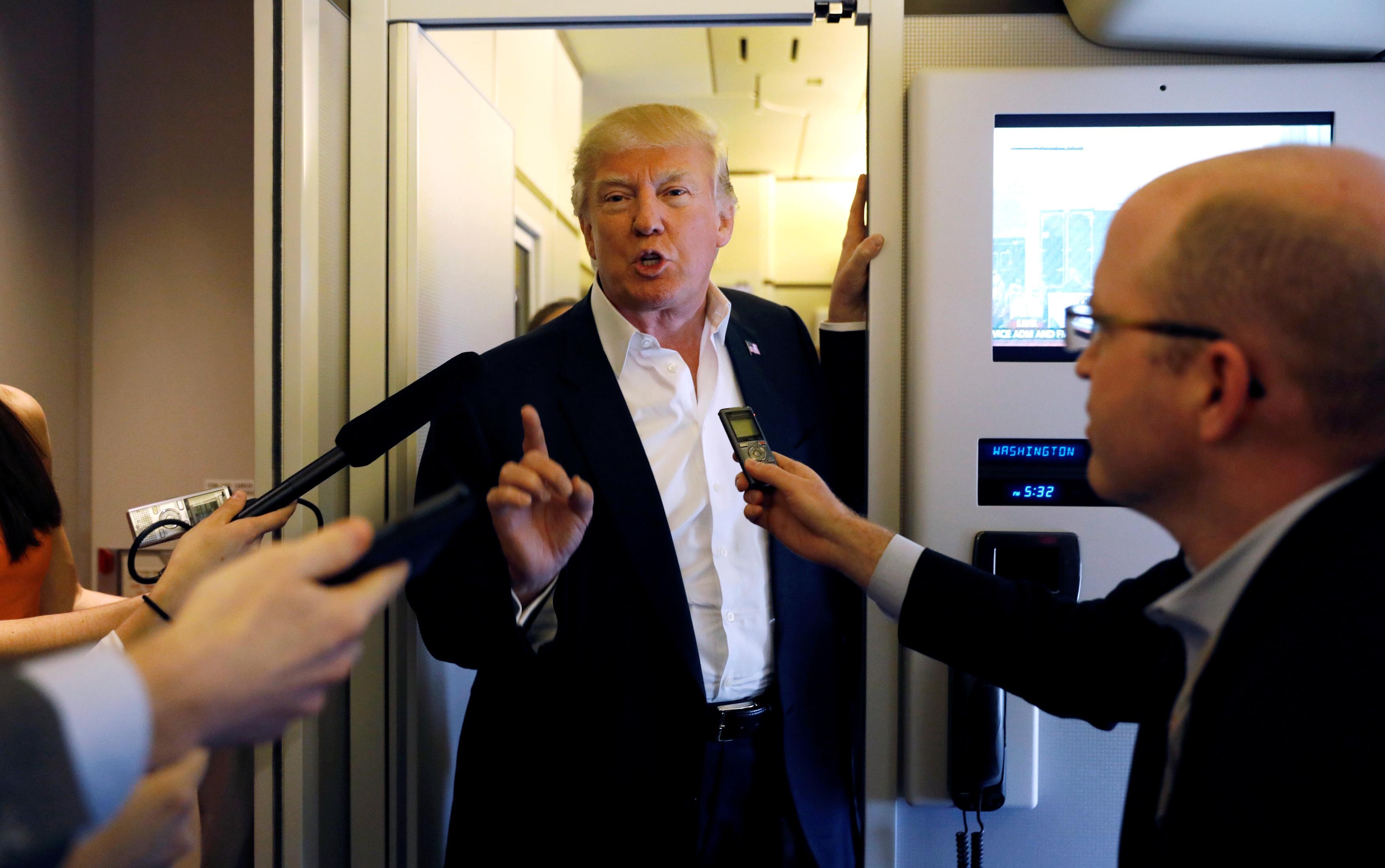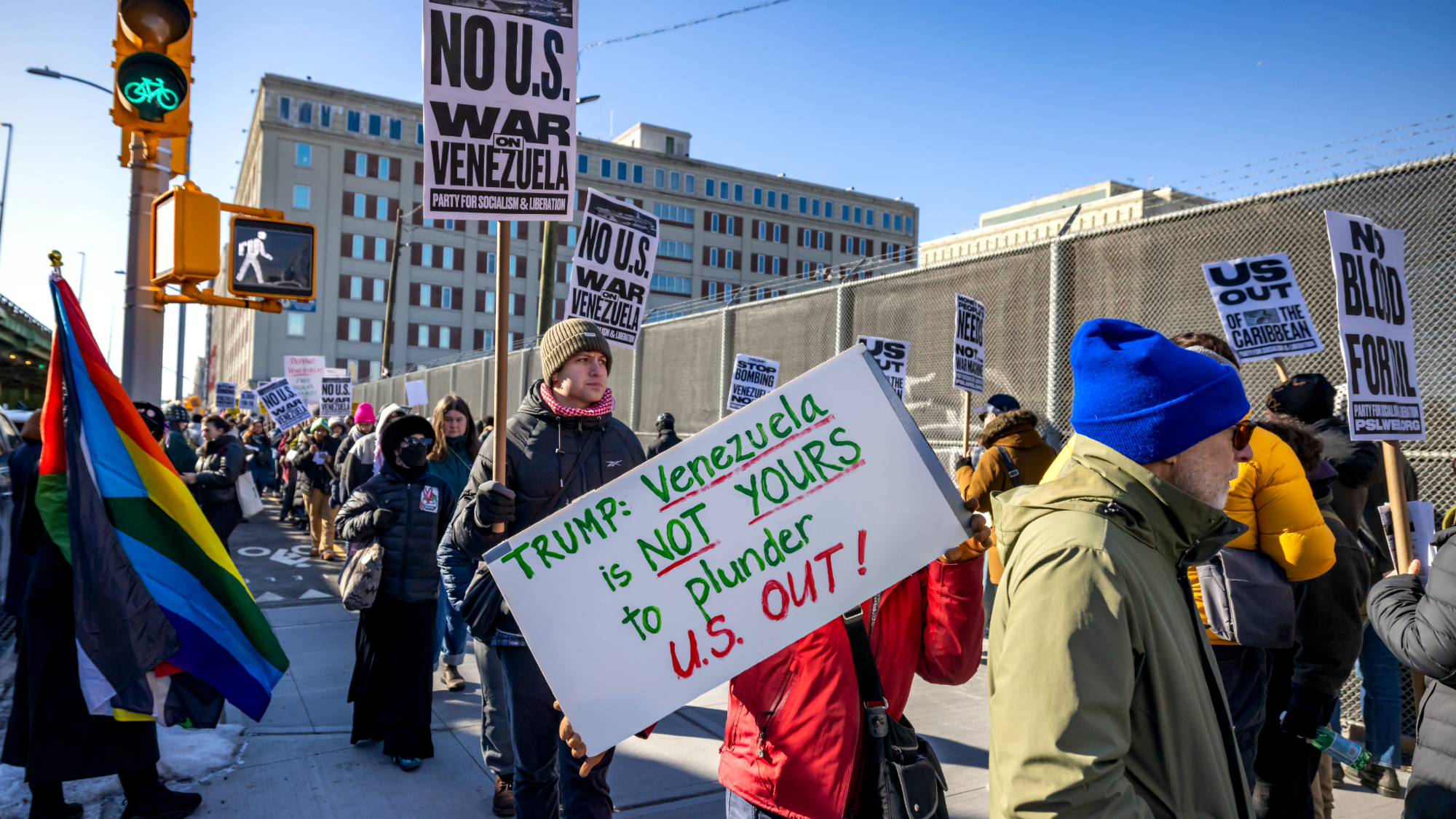The media should stop playing dumb about Trump
It's time to look in the mirror


Are President Trump's truculent attacks on the media both politically cynical and worrying for our democratic norms? Yes. Does Trump take significant liberties with the truth? Yes, of course. For crying out loud, the guy became a political fixture in the Republican Party by promoting the racist lie of birtherism.
At the same time, is there not something faintly ridiculous about the media's sudden re-imagining of itself as the last bastion and redoubt of democracy in a time of advancing darkness? Absolutely.
Trump's demonization of the media is a cynical political ploy. But this only raises the question of why this anti-media position should be politically advantageous? Why is journalism one of the least trusted professions among Americans, vying with Congress, prostitutes, and used car salesmen for the bottom of the rankings? Absolutely no self-reflection from the media has followed the election of Trump, only an orgy of self-righteousness and blame-shifting (Putin spread fake news! Or else it was Zuckerberg.).
The Week
Escape your echo chamber. Get the facts behind the news, plus analysis from multiple perspectives.

Sign up for The Week's Free Newsletters
From our morning news briefing to a weekly Good News Newsletter, get the best of The Week delivered directly to your inbox.
From our morning news briefing to a weekly Good News Newsletter, get the best of The Week delivered directly to your inbox.
President Trump is a motor-mouth, and he tends to speak in a strange, garbled way. He frequently lies. But that doesn't mean everything he says is untrue. And yet, the media often interprets his comments literally so that they seem untrue and fantastical, even when reading them in context shows that what Trump means is something much less outrageous, or at least different.
For example, during the campaign I pointed to the time Trump asserted on Hugh Hewitt's radio show that Barack Obama was "the founder of ISIS." This was breathlessly reported as an instance of Trump peddling yet another conspiracy theory. But the context shows what he really meant was the standard GOP talking point that Obama's policies led to the rise of ISIS. (A point that, by the way, many sober observers, and not just conservatives, would agree with.)
In a more recent example, during informal remarks, President Trump asserted that the crime rate is the highest it's been for 47 years. Wrong! shouted PolitiFact. In fact, crime has been decreasing for decades (although it has been rising recently). CNN's Jake Tapper memorably browbeat Kellyanne Conway over Trump's "lie." But was it a lie? No, the crime rate is not the highest that it's been in 47 years. In fact, it's nearly the lowest it's been in all that time. But you know what else is a fact? "FBI data from 2015 found that the murder rate across the country spiked 10.8 percent in 2015 — the largest single-year percentage jump since 1971." You know, about 45 years ago.
Trump was technically wrong, of course. But talking about a rate instead of an increase in the rate is something that can happen to anyone, even a statistics professor. And yet, Trump never for one second got the benefit of the doubt. Instead, the entire media corps immediately concluded that he was simply making things up and lying.
A free daily email with the biggest news stories of the day – and the best features from TheWeek.com
Now, is the spike a statistical fluke, as it might be, or the alarming start of a new dire trend, as Trump doubtlessly would have the American public believe? This is a much more interesting and important question than the shouting we got instead.
Of course, we shouldn't let Trump off the hook. Did the flub between rate and spike happen in his mouth, meaning he just misspoke as anyone could have? Or did it happen in his brain, meaning he doesn't understand the difference between a rate and a spike, in which case he is unqualified to run a lemonade stand, much less the executive branch of the federal government of the United States of America? These are very important questions that should have been asked.
You surely heard that Trump recently lamented a non-existent terror attack in Sweden. Much mockery ensued, with Swedes responding with viral videos. As the fact-checking website Snopes pointed out, however, no such attack happened.
But here's the thing: Trump was asserting that immigration in Sweden was a disaster. He was mixing together the European migrant crisis and terrorist attacks like the one in Nice and a segment he watched "last night" on Fox News in a water-muddying way. But it takes a weird kind of dishonesty to believe that he was asserting that a terrorist attack had occurred. Again, the media failed at a relatively easy comprehension test, and again we got self-righteousness, misinformation, and silliness instead of interesting questions. Because, guess what, a lot of very sober people do have very serious concerns about Sweden and migrants. What's more, there's an important critique of Trump's nationalism here; the fact that Trump was essentially mixing together immigration and terrorism as near-synonymous threats is not self-evident and deserves questioning. But that would mean correctly reading what he said and noting that he wasn't just talking about terrorism, but terrorism and immigration.
Trump frequently lies. He makes things up. But he isn't always lying or making things up. Sometimes he's just saying things in his very strange speaking style. And usually in such cases, it's pretty easy to tell what he's talking about, if you really listen and think. Instead, the media plays dumb and scores cheap points that ultimately undermine the press. It's bad journalism. Stop doing it.
When I suggested this on Twitter, I got a number of objections. The first one is that this is essentially "mind-reading" Trump. Now, there's a grain of truth here. There are some hard cases. But there are also plenty of easy cases, as noted above, and the media still fails at those. Let's first fix those and then argue about the others.
Another related complaint is that I'm asking the media to interpret Trump's remarks instead of report on them. I would argue that I'm simply asking the media to correctly report on them instead of incorrectly report on them.
Other critics said I was letting Trump off the hook for his garbled speaking style and frequent liberties with the truth. I am not suggesting any such thing. Trump should absolutely be criticized for not being able to speak in a cogent way, an essential requirement for any head of state, let alone the head of the most powerful state on the planet. But this is not in contradiction with correctly reporting what he said. As I pointed out with regard to his comments about crime, we should both realize what he means when he speaks like that, and ask what's going on when the president potentially (but not definitely) can't tell the difference between a rate and a spike.
This isn't rocket science. It's about basic reading comprehension, and the basics of journalism. We're getting the easy cases wrong. Let's step it up.
Pascal-Emmanuel Gobry is a writer and fellow at the Ethics and Public Policy Center. His writing has appeared at Forbes, The Atlantic, First Things, Commentary Magazine, The Daily Beast, The Federalist, Quartz, and other places. He lives in Paris with his beloved wife and daughter.
-
 Bari Weiss’ ‘60 Minutes’ scandal is about more than one report
Bari Weiss’ ‘60 Minutes’ scandal is about more than one reportIN THE SPOTLIGHT By blocking an approved segment on a controversial prison holding US deportees in El Salvador, the editor-in-chief of CBS News has become the main story
-
 Has Zohran Mamdani shown the Democrats how to win again?
Has Zohran Mamdani shown the Democrats how to win again?Today’s Big Question New York City mayoral election touted as victory for left-wing populists but moderate centrist wins elsewhere present more complex path for Democratic Party
-
 Millions turn out for anti-Trump ‘No Kings’ rallies
Millions turn out for anti-Trump ‘No Kings’ ralliesSpeed Read An estimated 7 million people participated, 2 million more than at the first ‘No Kings’ protest in June
-
 Ghislaine Maxwell: angling for a Trump pardon
Ghislaine Maxwell: angling for a Trump pardonTalking Point Convicted sex trafficker's testimony could shed new light on president's links to Jeffrey Epstein
-
 The last words and final moments of 40 presidents
The last words and final moments of 40 presidentsThe Explainer Some are eloquent quotes worthy of the holders of the highest office in the nation, and others... aren't
-
 The JFK files: the truth at last?
The JFK files: the truth at last?In The Spotlight More than 64,000 previously classified documents relating the 1963 assassination of John F. Kennedy have been released by the Trump administration
-
 'Seriously, not literally': how should the world take Donald Trump?
'Seriously, not literally': how should the world take Donald Trump?Today's big question White House rhetoric and reality look likely to become increasingly blurred
-
 Will Trump's 'madman' strategy pay off?
Will Trump's 'madman' strategy pay off?Today's Big Question Incoming US president likes to seem unpredictable but, this time round, world leaders could be wise to his playbook



